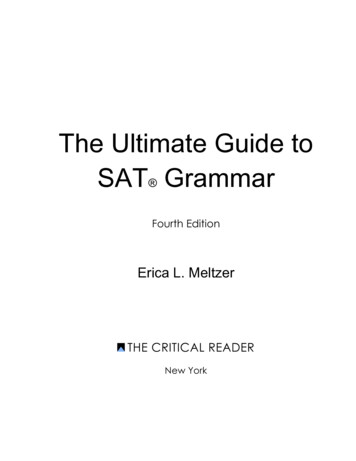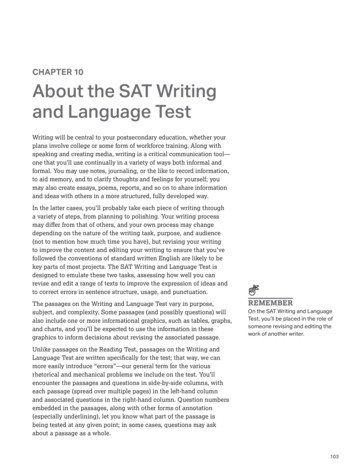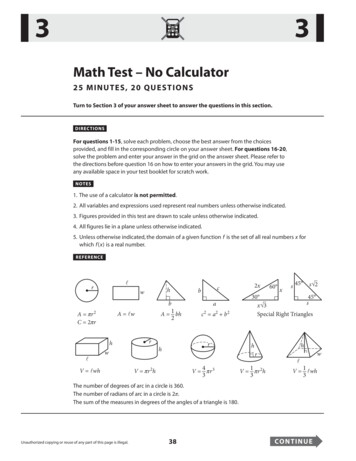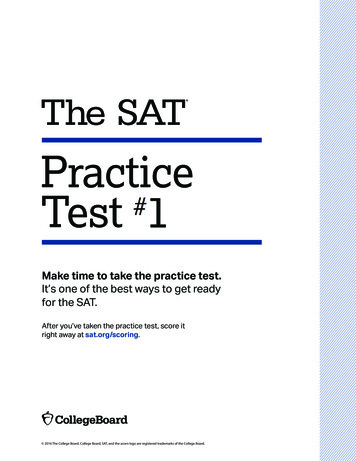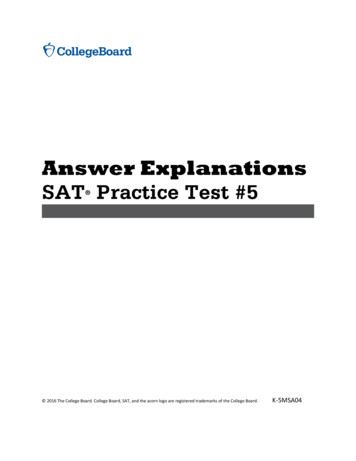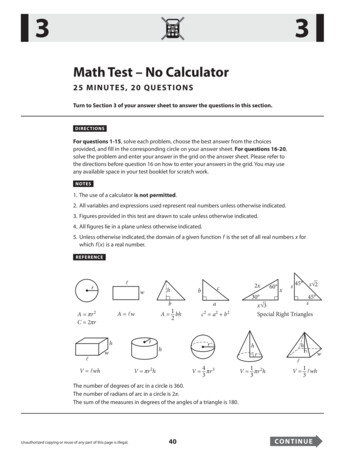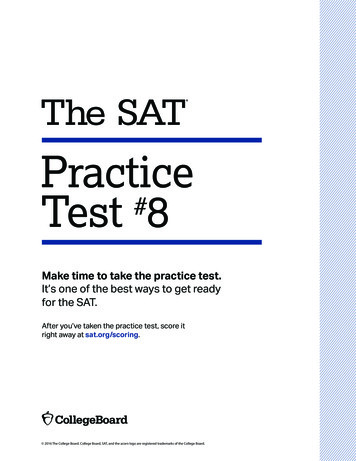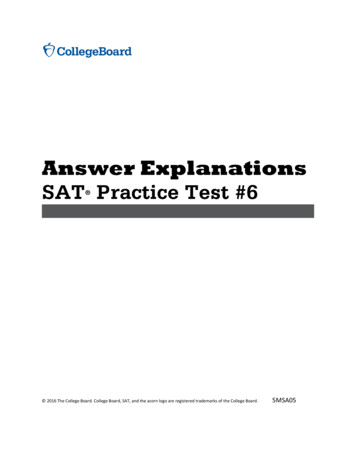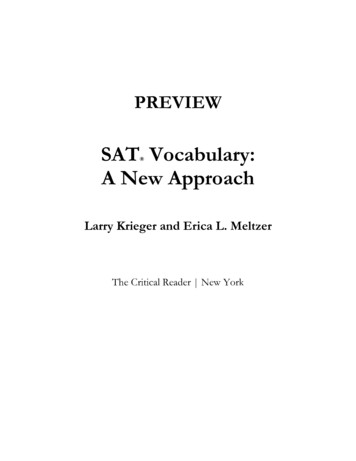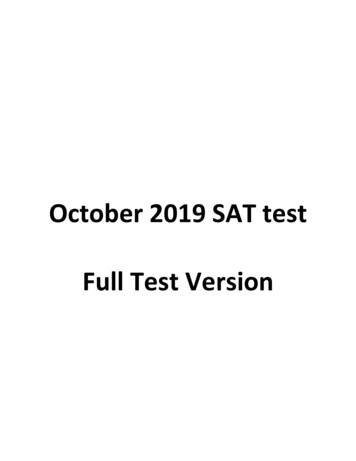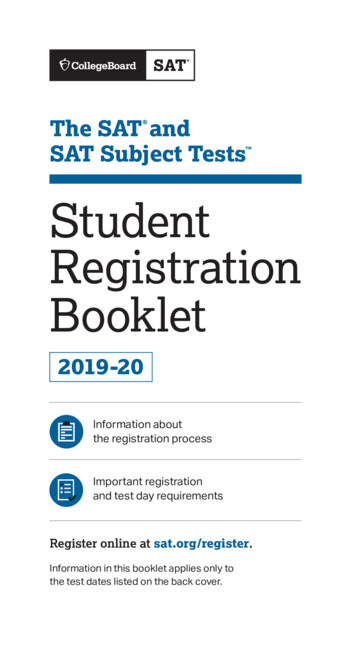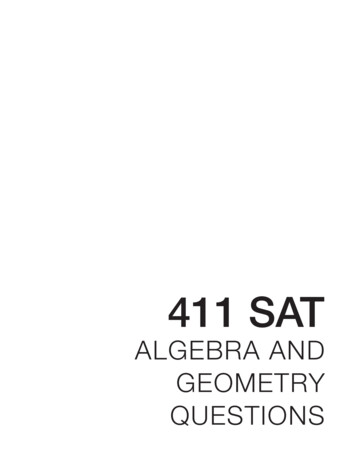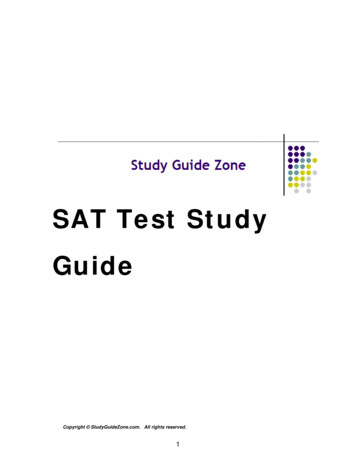
Transcription
SAT Test StudyGuideCopyright StudyGuideZone.com. All rights reserved.1
Table of ContentsSAT TEST RESOURCES. 4SAT OVERVIEW . 5MATH. 9MATHEMATICAL REASONING. 10Standard Multiple-Choice . 10Hand-calculated responses (with Grid-ins) . 11QUESTION TYPES . 13ARITHMETIC . 13DIVISIBILITY . 14MULTIPLICATION . 16ADDITION . 16SUBTRACTION . 17EVENS AND ODDS . 18PRIME NUMBERS . 20PERCENTS . 22SQUARE OF A NUMBER . 25EXPONENTS . 27ROOTS . 29AVERAGES . 30CRITICAL READING . 32READING PASSAGES . 32FLYING OVER THE PASSAGE . 32CREATING A TENTATIVE SUMMARY . 33OPENINGS AND ENDINGS . 34EXTRANEOUS INFORMATION . 34USING KITCHEN LOGIC . 35GETTING INTO THE AUTHOR’S MIND . 35EMOTIONAL WORDS . 36FINDING THE KEY WORDS . 37MAKING PROPER INFERENCES . 39APPLYING IDEAS FOR GENERALIZATIONS . 39Copyright StudyGuideZone.com. All rights reserved.2
USING CONTEXT CLUES . 40BREAKING DOWN PASSAGE ORGANIZATION . 41FIRST WORD ANALYSIS . 42UNDERSTANDING THE INTIMIDATION . 43FINDING YOUR OPTIMAL PACE . 44DON’T BE A PERFECTIONIST . 46FACTUALLY CORRECT, BUT ACTUALLY WRONG . 46DIFFERENT VIEWPOINTS . 47SENTENCE COMPLETIONS. 49TRY EVERY CHOICE . 49READ CAREFULLY . 49MULTIPLE BLANKS . 50FOCUS ON WHAT YOU KNOW . 50WRITING. 51APOSTROPHES. 52Possessive Nouns . 52Possessive Personal Pronouns vs. Contractions . 53COMMA ERRORS . 53PROBLEMS WITH REFERENCES . 55PROBLEMS WITH AGREEMENT . 57LACK OF PARALLELISM . 60MISCELLANEOUS PROBLEMS . 61WRITING AN ESSAY . 66PLANNING STAGE . 66STICKING TO THE PLAN. 66REVIEWING THE PLAN . 67BRAINSTORMING SMART . 67MAKING THE CUTS . 69ENDING AT THE START . 70STAYING CONSISTENT . 71MAINTAINING THE FLOW. 72BACKING UP YOUR POINTS . 72USING PROPER GRAMMAR . 73Copyright StudyGuideZone.com. All rights reserved.3
WATCHING YOUR VOCABULARY . 74AVOIDING TUNNEL VISION . 75JUST DO IT . 76CONCLUSION IS REVIEW. 77COMMUNICATING REASON, NOT PASSION . 77ANSWERING THE WHY? . 78SAT Test ResourcesFree SAT Practice Testshttp://www.testprepreview.com/sat practice.htmFinancial Aid Factshttp://www.finaidfacts.orgScholarship Helphttp://www.scholarshiphelp.orgStudy Tips and Informationhttp://www.studyguidezone.com/resource tips.htmCopyright StudyGuideZone.com. All rights reserved.4
SAT OverviewAs stated in its title, the Scholastic Aptitude Test (SAT) is indeed anaptitude test, and as such, it was required that media be chosen bywhich intellectual ability could be measured. In the case of the SAT,math and English were the selected media. While there is an ongoing,low-profile controversy about whether or not this test truly measure’syour abilities with regards to what you’ll need for college, that is notthe purpose of this book. The purpose is, however, to make sure thatyou’re able to achieve the best possible state of preparation, allowingyou to maximize your score potential - no matter if your actualaptitude has been measured.As no test can measure all aspects of a person’s intelligence, the SATmeasures those skills deemed most critical to a new college student.Then again, if any admission test, no matter how cleverly assembles,is inherently inadequate, why perform this type of testing at all? Thisis a question posed by every student who sees the SAT looming aheadof him/her. Nevertheless, the answer to this question is quite simple,and quite reasonable; to make college acceptance a more fairexperience, by expanding the basis approval beyond a your grades.The SAT is three hours in length, however, only two and a half hoursof this time is actually counted towards your score. An experimentalsection will also be included, but will not have an impact on your finalSAT score.Your SAT score is one of the most critical elements to yourqualification for college school, so it is naturally much too importantCopyright StudyGuideZone.com. All rights reserved.5
for you to take this test unprepared. The higher your SAT score, thebetter your chances of admission will be for a respected, competitivecollege.While different colleges assign a different weight or importance to yourSAT scores, it is safe to assume that your SAT will be a majordetermining factor when it comes to the final admission decision madeby each college to which you’ve applied.Careful preparation, as described in this expert guide, along with hardwork, will dramatically enhance your probability of success. In fact, itis wise to apply this philosophy not only to your college applications,but to other elements of your life as well, to raise you above thecompetition. Your SAT score is one of the areas in the collegeadmission process over which you have a substantial amount ofcontrol; this opportunity should not be taken lightly. Hence, arational, prepared approach to your SAT test as well as the rest of theadmission process will contribute considerably to the likelihood ofacceptance.Keep in mind, that although it is possible to take a SAT test more thanonce, you should never take the test as an “experiment” just to seehow well you do. It is of extreme importance that you always beprepared to do your best when taking the SAT.It won’t take you long to discover that the SAT is unlike any testyou’ve taken before, and it is probably unlike any test you will evertake again in your academic career. The typical high school or collegetest is a knowledge-based test. The SAT, however, is skills-based.Copyright StudyGuideZone.com. All rights reserved.6
What does this mean to you? It means that you’ll have to prepareyourself in a completely different way! You won’t simply be recitingmemorized facts as they were phrased in some textbook.The SAT requires you to think in a thorough, quick and strategicmanner and still be accura
SAT Overview As stated in its title, the Scholastic Aptitude Test (SAT) is indeed an aptitude test, and as such, it was required that media be chosen by which intellectual ability could be measured. In the case of the SAT, math and English were the selected media. While there is an ongoing, low-profile controversy about whether or not this test truly measure’s your abilities with regards to .
